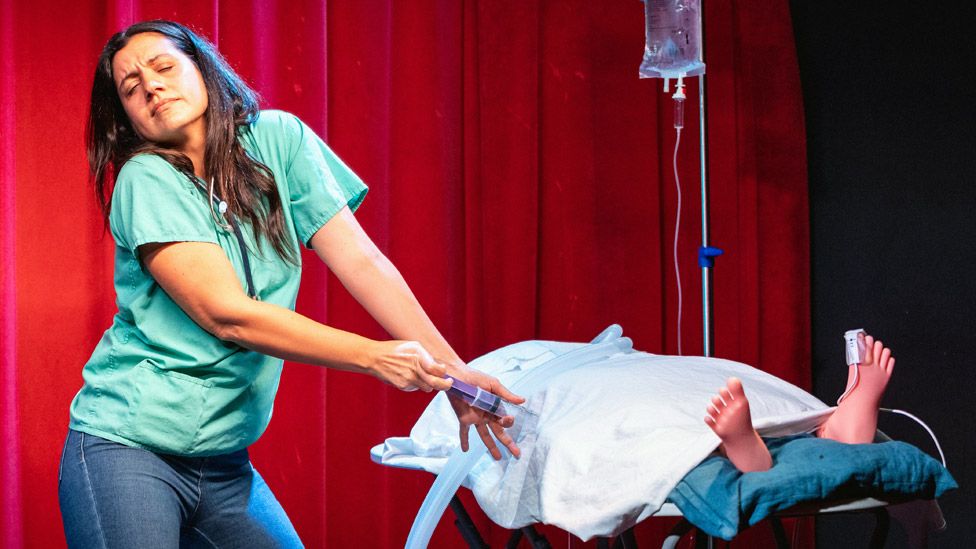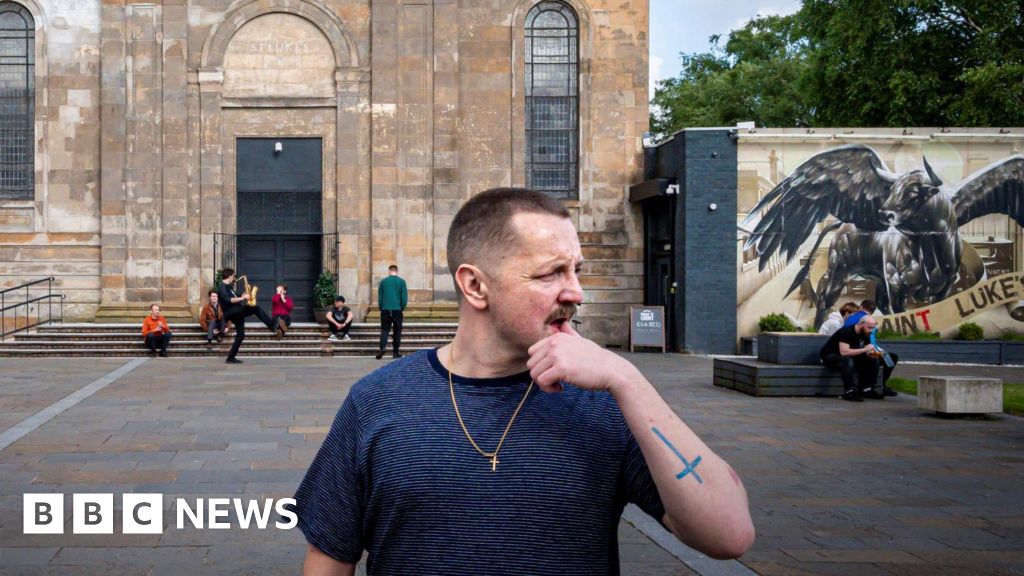ARTICLE AD BOX
By Ian Youngs
Entertainment reporter in Edinburgh
 Image source, Boris Mitkov
Image source, Boris Mitkov
Intensive care doctor Stefania Licari treating a dummy on stage in her show
With regular stories about delays and staffing shortages in the news, it may not seem that there's much to laugh about in the NHS. But a number of doctors are hoping laughter can be the best medicine with their own stand-up comedy shows at this year's Edinburgh Fringe.
Humour and absurdity can often spring from unexpected and stressful places, including hospital emergency departments. The connection between medicine and comedy has been established by doctors-turned-comics like Harry Hill, Paul Sinha and Adam Kay.
Here, four medics who have swapped the operating theatre for the comedy theatre in Edinburgh talk about finding the lighter side of working in the NHS, and how being part-time stand-up comedians helps them cope.
'Laughter is a reminder that there is life'
Intensive care doctor Stefania Licari remembers a recent case when she had to persuade a patient not to discharge himself.
"He would have died if he had not stayed and received the medication," she says. "I had a long chat with him. And I don't think I managed to convince him until I made a joke. He laughed, and you could see his energy changed. That laughter allowed him to gain trust in me."
The patient stayed, and the ability to break the tension of a hospital with humour - at the appropriate time - has often been a big help, Licari believes.
"The doctors, the nurses, the colleagues and at times the patients - when they were conscious - would just feel better if you were a little bit lighter and making jokes," she says. "I think that's crucial.
"Obviously it needs to be put in context and sometimes it's a timing thing, it can't be immediate, but there is always a possibility for some humour."
Image source, Stefania Licari
Image caption,Stefania Licari in hospital for real
During the extreme pressures of Covid, she says retaining the ability to have an occasional laugh was just as, if not more, important. "During the pandemic, when we saw all these people die, and then we started having colleagues of our age dying, it felt like we were in this war.
"And having a moment of laughter is like a reminder that there is life, because laughter is so powerful."
Licari's high-spirited Edinburgh show, titled Medico, is a mixture of light-hearted medical material and tales of her love life, often involving hospital colleagues.
Training in comedy and acting has made Licari, from Italy and now working in London, better at listening and communicating when working in a hospital, she says.
"Often doctors actually communicate very poorly. They are very shy, they mumble, they don't project over the chaos.
"Sometimes I get compliments on how I project my voice during cardiac arrests."
'Comedy is my prescription for myself'
Image source, Garry Carbon
Image caption,In his show No Scrubs, Michael Akadiri talks about how he's often judged differently depending on whether he's wearing his medical uniform
When Michael Akadiri isn't working night shifts as a junior doctor in London, he's performing at stand-up comedy clubs. The consequences if the two go badly are very different.
"A bad gig on a comedy stage, they call it death... but no-one actually dies," he says.
Akadiri has been a doctor for six years and a part-time comedian for five.
"With medicine, you're always dealing with people, and human interaction is a natural source for comedy - especially relatable, observational humour, which is where I like to take things," he says.
"There's always something that happens that could be used for comedy. I'm not as cynical as going to work just waiting for material. But things can happen."
His jokes "start from a truth", he adds. But, mindful of patient confidentiality, "I take it so far that it can't be traced back to the truth".
His debut Edinburgh show is called No Scrubs, a reference to the TLC song, the medical clothing - and how differently he is judged when he's in scrubs and when he's not.
"You see someone in scrubs, you assume they're a doctor," he says. "You're trusted. People put their lives in your hands. It's seldom that anyone judges me as an individual when they see the scrubs. When you take them off, it's [judging the] person first."
Akadiri's stand-up routine touches on the pressures of working in a hospital over the past two-and-a-half years.
"In my show, I talk about how the pandemic was for us as NHS staff and hopefully give people insight in how it was working in that environment.
"Not too much, not too heavy. It's always a fine line between trying to give a little message, but also it's a comedy show. You want people to be entertained."
'Some things aren't appropriate to joke about'
Image source, Ed Patrick
Image caption,Ed Patrick fronted the BBC Radio 2 chat show Infectious Personalities
There's a lot of crossover between medicine and stand-up, suggests anaesthetist and stand-up Ed Patrick. Experience of facing live audiences also makes it easier to "read a room" to determine what's really going on in a medical situation, he adds.
"Comedy is all about building up tension and then releasing it. Medicine is full of tension, and you need to have that release because if you had the tension the entire time, you would burn out pretty easily. So that's why we have the classic dark humour in medicine."
As well as doing a work in progress show titled Catch Your Breath at Edinburgh, Patrick recently published a book under the same title, one of a number of medical memoirs to come in the wake of Adam Kay's hit This Is Going To Hurt.
He also hosts the Comedians' Surgery podcast, and fronted the BBC Radio 2 chat show Infectious Personalities.
He is always on the lookout for material - although not every humorous situation can be used. "There are some things that are funny, but either wouldn't work or wouldn't be appropriate to make a joke about or talk about," he says.
Like his fellow doctor-comics, his show doesn't dwell too much on the more dark and difficult sides of working in frontline healthcare.
"It's something I'm looking to try and get across and work out the way to talk about it," he says. "If there was a moment that was funny, I would talk about it."
As it is, the current state of the NHS isn't much of a laughing matter. "We've got huge backlog of operations. The idea that everything has been caused by the last couple years isn't true," he says.
"This has been going for a while. I've seen more and more doctors leaving - good doctors either leaving the profession all together or going abroad."
'I'm the butt of my jokes, not the patients'
Image source, Mark Dawson Photography
Image caption,Kwame Asante is combining his careers with a masters in performing arts medicine
Kwame Asante is also on the lookout for funny moments during his A&E shifts in Birmingham - although he too is careful about which ones make it into his stand-up routine.
"Although I talk a lot about patient stories, it's very much making myself the butt of the joke," he explains. "I don't make fun of patients.
"I talk about A&E, the people I meet, I talk about people's health beliefs, I talk a little bit about how people like to lie to their doctors but the truth always comes out in the end."
Asante's Edinburgh show, titled Living In Sin, is a mixture of those anecdotes and his humorous observations about race and religion.
It is deliberately not too lewd or outrageous, though. "The question I ask myself is, if I had to sit any one of these audience members in a windowless room tomorrow afternoon and break terrible news to them, would I feel comfortable doing that?" he says.
"If I've been on stage the day before being really crass or crude or graphic, I'd probably feel embarrassed to see them again and have to do that."
Asante is now combining comedy and medicine by doing a masters in performing arts medicine. He says the pandemic made clear how important it is to have a way to let off steam.
"I didn't actually realise how much comedy contributed to my coping mechanisms until Covid came and suddenly there was no comedy circuit. At the same time, things ramped up medically.
"So I really thought, wow, it's not just getting up and telling jokes, it's actually quite a big thing for me."

 2 years ago
29
2 years ago
29








 English (US) ·
English (US) ·